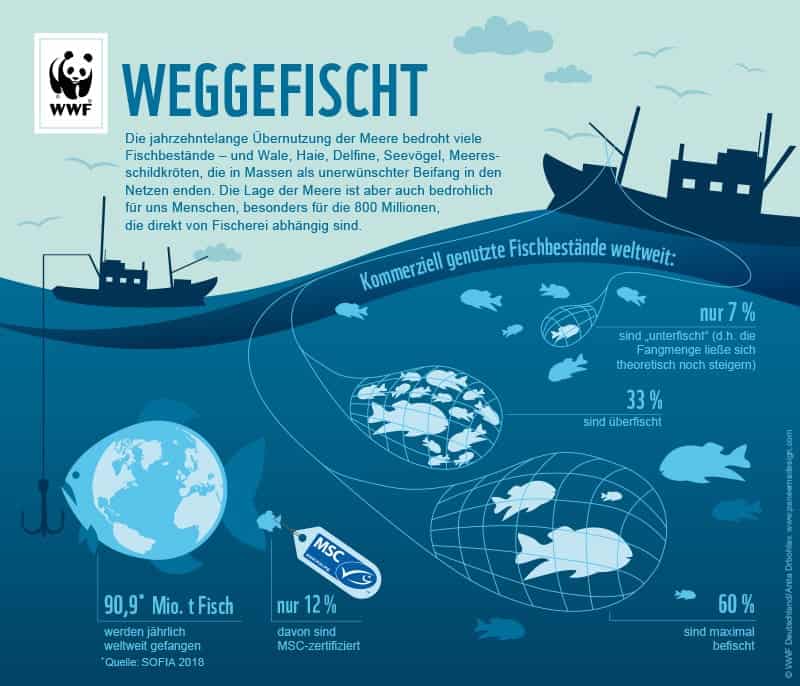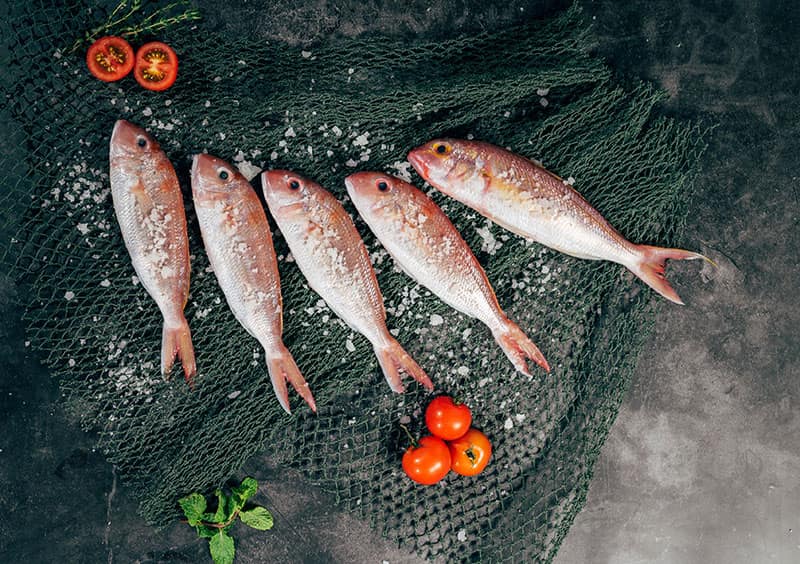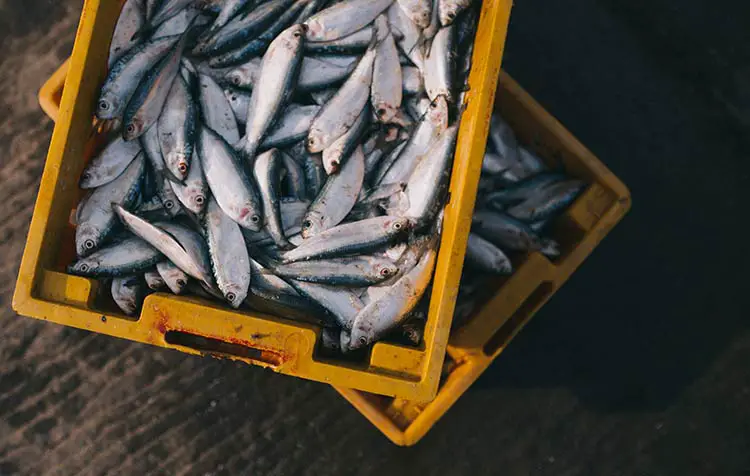In order to solve the man-made environmental problem of Overfishing of the seas tangible, scientifically collected figures, facts and statistics are imperative. They clearly illustrate how urgently we need new solutions to save the oceans.
In this short article I would like to give you the most important facts about the problem of overfishing.
NoteAll sources can be found in the bibliography below.
The most important facts, figures and statistics of overfishing

Overfishing affects different subject areas. For example, our consumption, the import of fish, the fishery itself and, of course, the forecasts for its future.
Statistics and figures on the state of the oceans
First of all, it is important to know how much our oceans are actually overfished. In line with this, here are the first statistics, which can also be seen in the graphic:
- More than 60% of global fish stocks are now considered maximally exploited.₁
- 33% of global fish stocks are now considered overfished.₂
- Only 7% of global fish stocks are considered "underfished".₃
Fish consumption and import facts
If we did not consume fish, it would remain largely untouched. In fact, much of the fish sold here comes from other regions of the world. Here are some facts about consumption and import:
- 61% of the fish consumed in Germany are imported from countries outside the EU. Only 39% of the fish come from European waters.₄
- In 2014, each person ate an average of 19.2 kg of fish. That is twice as much as 50 years earlier.₅
- Only 12% of the fish caught are MSC certified to date.₆
- The European Union is the largest fish importer in the world.₇
- About 54% percent of global fish imports come from developing countries.₈
Fisheries figures & statistics
Fisheries are in a dilemma - the more they fish, the less yield there will be in the future. Here are some statistics to go with it:
- In 2018, approximately 90.9 million tons of marine fish were caught worldwide.₉
- Fishermen nowadays drop their nets up to 2000 meters into the depth (https://www.planet-wissen.de/natur/meer/ueberfischung_der_meere/index.html)
- Fisheries generate about 38.5 million tons of bycatch per year.₁₀
- 6 billion tons of fish and seafood have been fished from the oceans since 1950.₁₁
- 11-26 million tons of the world's fishing is done illegally.₁₂
- At least 800 million people are directly dependent on fishing today.₁₃
Figures, statistics and facts for the future of the oceans

Last but not least, I'd like to share with you two statistics of overfishing that are particularly thought-provoking.
- According to calculations of the UN-According to the Unep environmental program, commercial fishing will no longer be possible worldwide by 2050 at the latest.₁₄
- In the near future, 26 million tons of fish could come from illegal and re-regulated fishing.₁₅
You can learn more about causes, consequences and also solutions in the fight against the environmental problem in the detailed article about the Overfishing of the seas. If you want to be part of the solution yourself, feel free to check out the post Stop overfishing inside.
Do you have any questions, tips or suggestions? Then feel free to leave a comment. By sharing these statistics or this page, you are helping to enlighten our society. Thank you very much!
Best regards,

PS: In our Blog for healthy food you will get many more tips.
If you use the facts and statistics from this post, please cite the following source. Thank you for your support!
https://www.careelite.de/ueberfischung-fakten-statistiken/References:
₁ Food and Agriculture Organization of the United Nations (FAO): The State of World Fisheries and Aquaculture 2014. Rome, p.7.
₂,₃ WWF Germany (2018): Überfischung: Bald drohen uns leerere Meere (Stand: 17.09.2018). , https://www.wwf.de/themen-projekte/meere-kuesten/fischerei/ueberfischung. [20.08.2019].
₄ Commitee On World Food Security (CFS, 2014): Sustainable fisheries and aquaculture for food security and nutrition (June 2014). http://www.fao.org/3/a-i3844e.pdf.
₅ FAO 2014, The State of World Fisheries and Aquaculture 2014, Rome, page 62.
₆ Marine Stewardship Council (MSC, 2019): "Good fish - The business of a guilty conscience." Responses from the MSC. https://www.msc.org/de/presse/stellungnahmen/das-geschaeft-mit-dem-fischsiegel. [20.08.2019].
₇ European Market Observatory for Fisheries and Aquaculture Products (EUMOFA (2014): The EU Fish Market. 2014 Edition, p.1.
₈ Food and Agriculture Organization of the United Nations (FAO, 2012): World fish trade to set new records. http://www.fao.org/news/story/en/item/214442/icode. [20.08.2019].
₉ Food and Agriculture Organization of the United Nations (FAO 2018): The State of World Fisheries and Aquaculture 2018. Rome, p.2.
₁₀ R.W.D. Davies, Cripps, S.J., Nickson, A., Porter, G.: Defining and estimating global marine fisheries bycatch. Marine Policy (2009), doi:10.1016/j.marpol.2009.01.003, p.20.
₁₁ WWF (2014): Living Planet Report - 2018 Timing higher. S. 7.
₁₂ Food and Agriculture Organization of the United Nations (FAO): The State of World Fisheries and Aquaculture 2014. Rome, p.84.
₁₃ WWF Germany (2018): Überfischung: Bald drohen uns leere Meere (Stand: 17.09.2018). , https://www.wwf.de/themen-projekte/meere-kuesten/fischerei/ueberfischung. [20.08.2019].
₁₄ https://www.planet-wissen.de/natur/meer/ueberfischung_der_meere/index.html.
₁₅ https://fischratgeber.wwf.at/hard-facts





